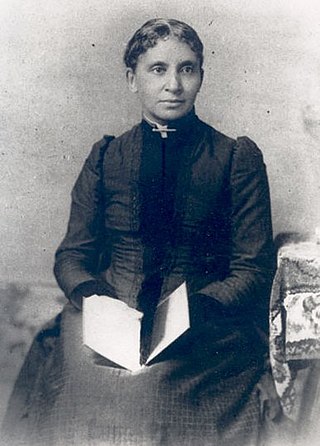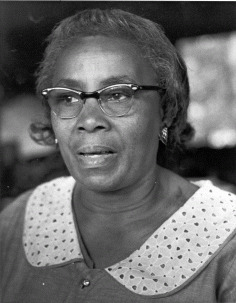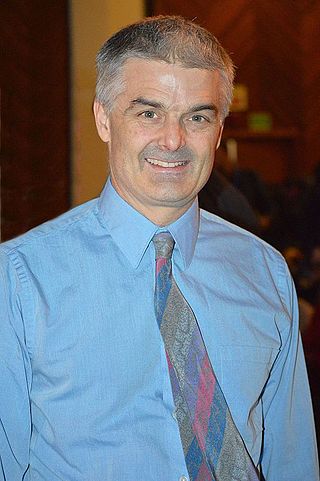Related Research Articles

Charlotte Louise Bridges Grimké was an African American anti-slavery activist, poet, and educator. She grew up in a prominent abolitionist family in Philadelphia. She taught school for years, including during the Civil War, to freedmen in South Carolina. Later in life she married Francis James Grimké, a Presbyterian minister who led a major church in Washington, DC, for decades. He was a nephew of the abolitionist Grimké sisters and was active in civil rights.
Lisa D. Delpit is an American educationalist, researcher, and author. She is the former executive director and Eminent Scholar at the Center for Urban Educational Excellence at Florida International University in Miami, Florida, Benjamin E. Mays Chair of Urban Educational Leadership at Georgia State University, and the first Felton G. Clark Distinguished Professor of Education at Southern University and A&M College in Baton Rouge, Louisiana. She earned the MacArthur "Genius" Fellowship for her research on school-community relations and cross-cultural communication.

Patricia Hill Collins is an American academic specializing in race, class, and gender. She is a distinguished university professor of sociology emerita at the University of Maryland, College Park. She is also the former head of the Department of African-American Studies at the University of Cincinnati. Collins was elected president of the American Sociological Association (ASA), and served in 2009 as the 100th president of the association – the first African-American woman to hold this position.

Septima Poinsette Clark was an African American educator and civil rights activist. Clark developed the literacy and citizenship workshops that played an important role in the drive for voting rights and civil rights for African Americans in the Civil Rights Movement. Septima Clark's work was commonly under-appreciated by Southern male activists. She became known as the "Queen Mother" or "Grandmother" of the Civil Rights Movement in the United States. Martin Luther King Jr. commonly referred to Clark as "The Mother of the Movement". Clark's argument for her position in the Civil Rights Movement was one that claimed "knowledge could empower marginalized groups in ways that formal legal equality couldn't."
Maria W. Stewart was an American teacher, journalist, abolitionist and lecturer known for her role in the anti-slavery and women's rights movements in the United States. The first known American woman to speak to a mixed audience of men and women, white and black, she was also the first African American woman to make public lectures, as well as to lecture about women's rights and make a public speech opposing slavery.
The Freedom Writers Foundation is a non-profit organization created to "inspire young, underprivileged students to pick up pens instead of guns." It was founded by Erin Gruwell, and John Tu is a benefactor.
Flocabulary is a Brooklyn-based company that creates educational hip hop songs, videos and additional materials for students in grades K-12. Founded in 2004 by Blake Harrison and Alex Rappaport, the company takes a nontraditional approach to teaching vocabulary, United States history, math, science and other subjects by integrating content into recorded raps. Flocabulary's website features videos, lesson plans, activities and assessment or with songs. The company's name is a portmanteau of "flow" and "vocabulary".

During the era of slavery in the United States, the education of enslaved African Americans, except for religious instruction, was discouraged, and eventually made illegal in most of the Southern states. After 1831, the prohibition was extended in some states to free blacks as well. Even if educating Blacks was legal, they still had little access to education, in the North as well as the South.

Donna Wilson is an educational and school psychologist, teacher educator, and author of 20 books applying mind, brain, and education science. Wilson is the head of academic affairs of the Center for Innovative Education and Prevention (CIEP) and BrainSMART. She presents at educational conferences in the United States and internationally and blogs regularly on Edutopia. She serves as advisor to New York City's Portfolio School and on the foundation of Carl Albert State College.

Anti-literacy laws in many slave states before and during the American Civil War affected slaves, freedmen, and in some cases all people of color. Some laws arose from concerns that literate slaves could forge the documents required to escape to a free state. According to William M. Banks, "Many slaves who learned to write did indeed achieve freedom by this method. The wanted posters for runaways often mentioned whether the escapee could write." Anti-literacy laws also arose from fears of slave insurrection, particularly around the time of abolitionist David Walker's 1829 publication of Appeal to the Colored Citizens of the World, which openly advocated rebellion, and Nat Turner's Rebellion of 1831.
Hip hop based education (HHBE) refers to the use of hip hop, especially rap songs and lyrics, as curricular resources.
Gloria Long Anderson is the Fuller E. Callaway Professor of Chemistry at Morris Brown College, and its vice president for academic affairs. She has served as interim president of Morris Brown, and as vice chair of the Corporation for Public Broadcasting. She was a pioneer in the field of nuclear magnetic resonance spectroscopy, and is known for her studies of fluorine-19 and solid rocket propellants.

Jon (Jonathan) Bergmann is a chemistry teacher and one of the developers of the "flipped classroom" model of teaching along with fellow chemistry teacher Aaron Sams. Although already noted for his teaching, Bergmann decided to "flip" what students did in his classes, watching video lectures at home and doing exercises (homework) in class under supervision. He and Sams not only found that grades went up, they also found time for other types of activities, which Bergmann states is more important than the videos. Bergmann has since become the lead technology facilitator for a school in Illinois, and has worked to promote the models speaking at schools, universities and more both in the United States and abroad. He currently teaches science at a high school in suburban Houston Texas.
Jennie Patrick is an American chemical engineer and educator. As a high school student, she participated in the integration of Alabama's public schools. At Massachusetts Institute of Technology in 1979, she became one of the first African American women in the United States to earn a doctorate in traditional chemical engineering. She went on to pioneer work on supercritical fluid extraction. Her educational work has focused on the mentoring of African American and female students.
Erica Nicole Walker is an American mathematician and the Clifford Brewster Upton Professor of Mathematics Education at Teachers College, Columbia University, where she also serves as the Chairperson of the Department of Mathematics, Science, and Technology and as the Director of the Institute for Urban and Minority Education. Walker’s research focuses on the "social and cultural factors as well as educational policies and practices that facilitate mathematics engagement, learning and performance, especially for underserved students".

Kyra Danielle Gaunt is an African American ethnomusicologist, Black girlhood studies advocate, social media researcher, feminist performance artist, and professor at the University at Albany in New York State. Gaunt's research focuses on the hidden musicianship of black girls' musical play at the intersections of race, racism, gender, heterosexism, misogynoir, age, and the kinetic-orality of the female body in the age of hip-hop. Her current research focuses on "the unintended consequences of gender, race, and technology from YouTube to Wikipedia."
Pierre Wilbert Orelus, an educator and a prolific writer, was born in Port-au-Prince, Haiti, to a working-class family. After graduating from Lycee Alexandre Petion in 1991, he went on to study social work at the faculty of Human Sciences but he did not complete it. Orelus left his native land for the United States in the early 1990s. While he was in his early 20s, he attended a community college during the day with his older brother, Lyonel Orelus, while at the same time taking ESL classes at a community center in Cambridge, Massachusetts, at night in order to improve his English skills.
Joycelyn Wilson is an assistant professor of hip hop studies and digital humanities in the Black Media Studies cohort, located in the school of literature, media, and communication in the Ivan Allen College at the Georgia Institute of Technology. As an educational anthropologist, Wilson is an expert in African-American music and performance - with particular interests in contemporary modes of cultural production in the American South and Hip Hop in general, as well as their broad impact on higher education. She is also the founder and CEO of the HipHop2020 Archive and Innovation Lab, an educational resources design studio inspired by the Hip Hop Archive.
Edmonia Highgate, was an educator, writer, and activist for freed people in the post-Civil War Reconstruction era. Though born in Syracuse, New York, Highgate's work with the American Missionary Association brought her south to teach freed slaves in locations such as Norfolk, Virginia, and New Orleans, Louisiana.
Abolitionist teaching, also known as abolitionist pedagogy, is a set of practices and approaches to teaching that emphasize abolishing educational practices considered by its proponents to be inherently problematic and oppressive. The term was coined by education professor and critical theorist Bettina Love.
References
- 1 2 3 4 "About – Bettina Love".
- ↑ "College of Education Global". coe.uga.edu.
- 1 2 "About – Bettina Love" . Retrieved March 6, 2022.
- ↑ "Abolitionist Teaching in Action: Q&A with Bettina L. Love". www.ascd.org.
- 1 2 https://doc-14-14-docs.googleusercontent.com/docs/securesc/tsrj37ticemk45ck41ghkooaf6bf90e3/3d82o7imjr8s4p865affd4i29pspn7pg/1594142850000/07354224754123127387/16754368047740941437/1Y2affHxKWe4e7dI1onZCjytV6tdgxdHK?authuser=0&nonce=ijr46695rp0ng&user=16754368047740941437&hash=ribsfqb4ptsh5misca5dh1kdpsb7pegu%5B%5D
- 1 2 "Calendar Meeting List | Monterey Peninsula College". www.mpc.edu. September 18, 2020. Retrieved March 6, 2022.
- ↑ "Biden admin promotes radical group pushing critical race theory in schools". Fox News . July 19, 2021.
- 1 2 "Bettina Love | Kennedy Center". The Kennedy Center. Retrieved March 6, 2022.
- ↑ "2019 NACSA Leadership Conference, Dr. Bettina Love" . Retrieved March 6, 2022.
- ↑ "Video". www.youtube.com. Retrieved July 9, 2020.
- ↑ "[We Want to Do More Than Survive]| C-SPAN.org". www.c-span.org.
- ↑ Love, Bettina (2023). Punished for Dreaming: How School Reform Harms Black Children and How We Heal (1st ed.). St. Martin's Press. ISBN 1250280389.
- ↑ Reid, Shamari (October 2021). "Book Review: We want to do more than survive: Abolitionist teaching and the pursuit of educational freedom". Urban Education. 56 (8): 1388–1395. doi:10.1177/0042085920914367. ISSN 0042-0859. S2CID 216481410.
- ↑ Sanchez, Shena (February 18, 2021). "We want to do more than survive: abolitionist teaching and the pursuit of educational freedom". International Journal of Qualitative Studies in Education. 36 (4): 511–516. doi:10.1080/09518398.2021.1885070. ISSN 0951-8398. S2CID 233912907.
- ↑ Popielarz, Kaitlin E. (January 2020). "Book Review". The Journal of Social Studies Research. 44 (1): 1–5. doi:10.1016/j.jssr.2019.09.006. S2CID 242932151.
- ↑ Foltz, Katelyn (August 2021). "Thriving, Not Surviving in Education". Contexts. 20 (3): 66–67. doi:10.1177/15365042211035345. ISSN 1536-5042. S2CID 237010941.
- ↑ Love, Bettina L. (March 20, 2019). "Dear White Teachers: You Can't Love Your Black Students If You Don't Know Them – Education Week". Education Week.